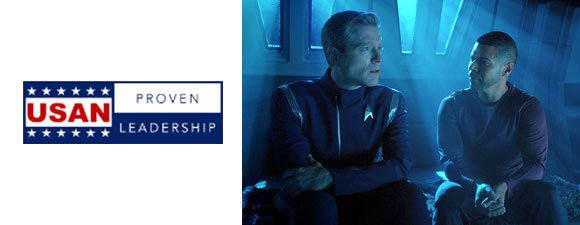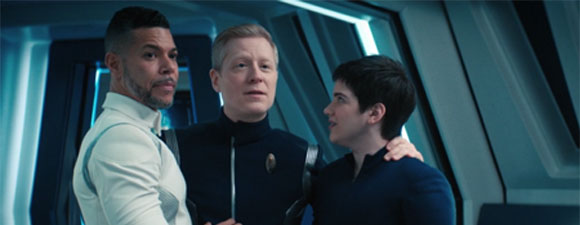Frakes: Early TNG Seasons Were ‘Not Real Fun’
2 min readJonathan Frakes admitted this week that it took a few years before he really got to enjoy his role as Commander Riker on Star Trek: The Next Generation.
“I looked very, very stiff in those early seasons because I was so intent on living up to the vision that [Gene Roddenberry] had, and it was not real fun,” the actor told the Los Angeles Times. Roddenberry had written Riker as a dedicated first officer, for whom duty came above everything.
“I’m a little more silly than that,” Frakes said. Fortunately, he was able to incorporate the lighter sides from his own life into his character after he mentioned to one of the writers his love of jazz. “All of a sudden, Riker was playing the trombone, and they let a little bit of the playfulness in. And it all changed for the better.”
Another of these changes was that Frakes was given the opportunity to expand his role and try his hand at the director’s chair. “I loved my job, I loved the people I was working with, but I just felt antsy,” Frakes said. “So I looked around and asked: What’s the best job on the set? To me, the best job on the set appeared to be the director’s job. I knew something about staging, I knew something about acting, I had been around the camera a lot. So I started rolling around this idea.”
“He allowed me to go to what we now call Paramount University and I spent like 300 hours in the editing room, I’d go to pre-production and go to post-production, I’d go to scoring sessions and the sound-spotting and just all of it,” Frakes continued. “I think in the back of his mind he was hoping I would lose interest. The last thing he wants is to open that floodgate of actors who want to direct.”
In the full interview, Frakes reflects on his recent reunion with the TNG cast at the Calgary Expo, and shares some more memories of his long time as part of the crew of the Enterprise.







It sure showed. They were stiff indeed similar to Star Trek the Motion Picture. Wrath of Khan seemed to put more faith in the actors and later TNG seasons, I think more attention was played on developing the characters and putting them in more believable or relevant conflicts and situations.
The first season had some really laughable episodes (the one with the planet of happy half naked blonde people with crazy law enforcement rules) and included a remake of a prior theme (Naked Now). They started taking chances and expanded their writers and hired consultants with expertise in the human behavior.
But after the Borg storyline, the episodes started getting good, really good and they took chances like “second chances” which were mindboggling possibilities. By Season 6 these guys were masters of Sci Fi art making. I wish they made another season’s worth because those last 2-3 season were really good.
I think this is generally true for most successful TV series where they really find themselves in later seasons. However you fight the spectre of running out of good ideas for episodes. Ironically, the original 1966 series I thought the best episodes began from the start. I think then they started reducing the budget in season 2 and the quality of programming diminished like how the quality of the Planet of the Apes Movies went from 1 to 5 when they started wearing Halloween masks for the Apes.
I think Frakes’ comment about being beholden to Roddenberry is telling, as is how you pinpointed that The Best of Both Worlds was the turning point (for you) for TNG.
Roddenberry had very strong views of how the series should be. He was also a humanist and, in my opinion, a utopian who had difficulty seeing perspectives that differed from his own. He was also, by most accounts I’ve read, a control freak. By the time TBoBW rolled around, if memory serves, Roddenberry was no longer deeply involved in the day-to-day operation of the series. In all likelihood, that freed the producers to do other things with the series. Being freed from the shackles of Roddenberry’s absolutist approach to Trek, I think it freed them to explore more interesting themes. (This is especially true, imo, of DS9.)
I agree that most series don’t begin with well-developed characters and it takes several seasons for the shape of the character to fill in.
I completely agree with you. No offense to Roddenberry, but modern Trek did not start to really improve until he passed away.
Sadly, it didn’t hold up, as we had the godawful writing of the first 4-5 seasons of Voyager, and then the hackneyed mess that was the first three seasons of Enterprise to follow.
Roddenberry passed over the reins to TNG to Berman half-way through the first season. Quite a few things people find at fault about early TNG really only involved Roddenberry in the sense that he gave approval of what Berman was doing.
That I didn’t know, but I’m glad to. Generally it’s been easy and accurate to blame Berman and Braga for the bad judgments in later Trek TV years too. To quote redlettermedia, “What is it with Ricks?!”
(referring to Rick Berman AND Rick McCallum of Prequel fame)
Bring me the head of Rick Berman.
I’m afraid I have to break with conventional wisdom and aver that Berman didn’t do Trek as much of a disservice as people think. Yes, I think he stayed TOO long with the franchise and ran it into the ground with too much same-ness.
But he was the impetus behind my favorite Trek series of all time, DS9. I think the key mistake he made with Voyager was to hand the reins to Braga who, at least if you listen to folks like Ron D Moore, was a less than capable showrunner. (I tend to give RDM credit since he is behind most of the Trek stuff I like, as well as BSG.) I think Enterprise’s heart was in the right place, but the format was dated compared to the new, hot shows that emphasized the serial approach to television instead of the episodic.
I really do think Berman tried to keep Trek on track, but in the end it got away from him. He should have stopped after DS9 and First Contact and the whole Trek backlot should have been mixed up to give new voices some control. Of course, that’s all hindsight and certainly nothing anyone could have seen before the whole thing went off the rails with Enterprise and Nemesis.
Except that it went off the rails a lot earlier than that… most of Voyager was a stilted rehash of Next Gen episodes, and not just the format, but the script-writing and character inconsistencies of Enterprise really piled up. Yeah, I think the heart was definitely in the right place… and the fourth season turned out to be amazing, one of my favorite seasons of ANY of the Trek shows… and then it ended with probably the crappiest, crappiest episode of sci-fi TV I have ever had to watch (worse than TNG’s Season 2 finale) written by… yep, Berman and Braga.
Paramount had years of poor performance going back, and I’m of the opinion that DS9 succeeded in spite of Berman rather than because of him. A lot of the same people that made it so good also came in at series end and actually turned the last 2-3 seasons of Voyager into something exciting and fresh.
Manny Coto, bless his heart, also helped Enterprise find its legs in that last year.
Also, it didn’t help that the show was also on a fake network. 😉 UPN/CW… whatever you want to call it, has always been the ugly stepsibling of network television.
Sorry, but I think that RDM is a raving egotist who wanted to do to the franchise what he later did to Battlestar Galactica-except that he couldn’t, at least not while Berman & Braga were around and running things. Most likely what he wanted B&B to do is what ended up on Battlestar Galactica; characters being not as Starfleet-like as most people know them, plus all of the other stuff we’ve seen on Battlestar Galactica and other shows. The results of what RDM did for Battlestar Galactica, are, at best, debatable, and while most people love what was done with Battlestar Galactica, the long-time fans of the show aren’t in love with it-this well-known critic and Big Name Fan of SF was pretty harsh about what RDM got to do to Battlestar Galactica that he couldn’t do to Star Trek.
In a sense, I think that TV changed, but the Star Trek franchise couldn’t change with it to make it’s characters like the ones on the most popular shows, and it suffered-although season four of Enterprise was somewhat like Battlestar Galactica enough that it should be well-regarded by most of the detractors of the B&B era, I’d think.
I have to disagree. I’ve seen footage of Frakes in the 1st season blooper real–and he was being a real cut-up. And I also have to disagree about the early seasons being “stiff” and the later more relaxed. I’ve seen the first two seasons in comparison, to say, season 7, were *way* more relaxed and cordial. Do you think they would have had an episode like “The Naked Now” in season 7 with the limerick: “There once was a lady from Venus…”?
I remember quite a few interviews with the TNG crew early on focusing on how incredibly uncomfortable those skin tight uniforms were. I can imagine that constant discomfort has something to do with how they were acting on screen.
I find I now enjoy seasons 1 and 2 almost much more than 6 or 7. By the end I felt everything had gotten so safe and bland. And now that I’m a little older I find myself really enjoying the much more dramatic music and lighting of the very earliest seasons. I’m even think the early uniform was a much more stylish cut.
Roddenberry, Moore and Berman were all geniuses. As an example, probably true that Roddenberry was too controlling. I think the episodes get better because you bring more people into the fold, many new writers, newer perspectives. Roddenberry was just one guy and he may have just run out of ideas and if he didn’t let too much control get away from him, then you’re just left with him.
A lot of people praised Harve Bennett for Khan. He saw every episode of the original series and honed in to Ricardo Montalban. I think bringing new directorial blood into the movie series helped and it started a new trend. The second trend was letting Nimoy direct some of the movies and that was a big plus. I even think Bennett had some reservations about Nimoy directing but bringing new blood or new perspectives into the star trek masterpieces helped shape expanding its universe.